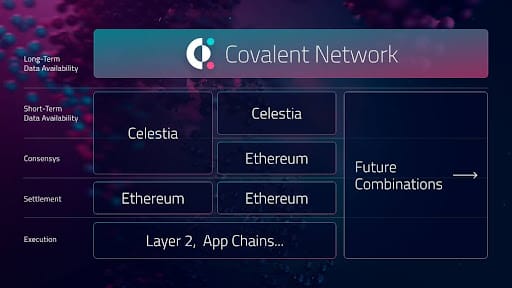Covalent, the leading historical data availability network empowering 1000’s of customers and developers with its structured data infrastructure on over +225 chains in Web3, is aligning its innovative solution to meet the needs of future advancements of Ethereum, particularly in light of the Ethereum Improvement Proposal 4844 (EIP-4844). With Covalent’s robust infrastructure, users and developers can access a wealth of structured, verifiable data from an ever-growing repository of billions of data points, enriching over 280 million wallets to date and shaping the AI and DeFi industries with structured information.
As Ethereum scales, it must periodically discard historical rollup data to maintain a lean framework. This practice renders the rollup data irretrievable after just 18 days, underscoring the necessity for a permanent solution that ensures long-term data availability. Such a solution is critical to addressing bottlenecks in scalability and efficiency that are crucial as Ethereum continues to grow in a decentralized way.
Covalent Emerges As The Long-term Data Availability Solution
This is where Covalent emerges as the primary solution with the “Ethereum Wayback Machine.” This is not just another data storage solution; it is a strategic modular answer to the constraints of current Data Availability mechanisms only offering short-term arbitrary data space—offering a permanent decentralized gateway to historical data vital for Ethereum’s continuously evolving ecosystem.
The Landscape of EVM Layer 2 Solutions
To assess the impact of Covalent’s solution on the Ethereum ecosystem, we examine the Total Value Locked (TVL) in various Ethereum Layer 2s (L2) solutions that utilize Ehthereum’s newly introduced Blob storage for posted rollup data. Here’s a snapshot of the TVL across the leading EVM-compatible L2s leveraging this technology:
These L2 platforms, totaling approximately $5.4 billion in TVL, are leading users of Covalent’s Ethereum Wayback Machine which controls and outputs long term blob data. Covalent supports 6 of the top 10 L2 projects that utilize blob storage for their DA needs, affirming its crucial role in enhancing data access across these networks. The utility of blobs, primarily demonstrated through rollup data, is currently undergoing further validation and exploration for other applications, pointing to a future where long-term data becomes increasingly critical.
Securing Long-Term Data Availability with the Ethereum Wayback Machine
Ethereum introduced blobs to mitigate rising gas fees by temporarily posting Layer 2 (L2) rollup data on the beacon chain, aiming to reduce transaction costs. However, blobs are only available for about 18 days, after which the data becomes irretrievable—thus the need for Long-Term Data Availability.However, this is a challenging problem to address and as such Covalent has strategically positioned itself to offer a permanent solution through its Ethereum Wayback Machine––contributing to a more sustainable and cost-effective ecosystem for Ethereum and Web3.
Unlike temporary solutions that only address short-term DA needs, Covalent’s Ethereum Wayback Machine offers a perpetual access point to this data. This effectively overcomes the 18-day availability limit of Ethereum’s blobs and establishes a new benchmark for data permanence within the blockchain ecosystem. By ensuring that historical data is always accessible, Covalent not only meets the immediate needs of developers and users but also captures the growing market demand for decentralized data infrastructure like these current preferences for long-term data solutions that perfectly aligns with the long-tail increase in demand for blobs storage.
This approach starkly contrasts with other emerging technologies, which while innovative, do not provide the same level of historical data integration and permanent access. This difference is crucial for developers who rely on complete data sets for the creation and maintenance of decentralized applications (DApps).
Market Position and Future Potential
Covalent stands out in its ability to capitalize on the market’s increasing preference for Ethereum’s native Data Availability (DA) solutions. With its extensive network comprising over 225 chains and an expanding database of structured, verifiable and historical data, Covalent addresses key issues like scalability while simultaneously improving the decentralization and efficiency across the Ethereum ecosystem.
As the Ethereum network grows, the importance of Covalent’s Ethereum Wayback Machine becomes increasingly clear. Built to support future self-serve options like Query Operator Nodes Covalent’s infrastructure offers boundless possibilities to enhance both the supply and demand within the network. Its commitment to providing immediate data access highlights Covalent’s dedication to fostering a decentralized and accessible environment, addressing key challenges in Ethereum’s scalability.
About Covalent
Covalent (CQT) is shipping data infrastructure for the decentralized ecosystem, solving Long-Term Data Availability for Ethereum—infrastructure that can re-execute blobs and shape AI. With CQT staking now back on Ethereum, The New Dawn of network expansion towards the Ethereum Wayback Machine commences. Today, this means AI use cases have unfettered access to onchain data from over +225 blockchains and growing.
Trusted by Fidelity, Rainbow Wallet, Consensys, and hundreds more.
Learn about the EWM: Technical | Non-Technical
For more information, check out Covalent’s: Official Website | Twitter/X | Linktree
Disclaimer: The text above is an advertorial article that is not part of Cryptonews.com editorial content.
Read the full article here




